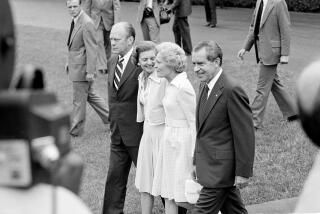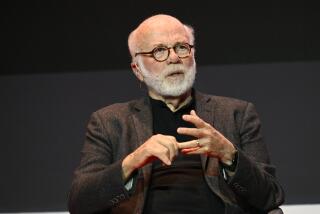Grants Will Encourage Social Change
- Share via
Seeking to promote community-based leadership, the Ford Foundation will launch a $19-million initiative today to provide grants to people and organizations that are successfully tackling tough social issues.
With two-year grants of $130,000, Ford’s Leadership for a Changing World program aims to reward individuals who are making a difference but are not well known outside their communities.
The award program is similar in some ways to the legendary MacArthur Fellowships, which often vault recipients out of obscurity by funding “genius” accomplishment in a variety of areas. The new Ford grants will encourage recipients to remain in their communities and continue their work.
“What we’re about is recognizing and supporting leadership for social change,” said Kathleen Sheekey, a co-director of the Advocacy Institute in Washington, which will manage the program. “I think it’s groundbreaking.”
Over six years, the leadership grants will be awarded to 60 individuals or teams who have worked at least two years in fields such as economic and community development, human rights, the arts, education, sexual and reproductive health, religion, media and the environment.
Most of this work, Sheekey noted, is unheralded, and much of it unpopular. Ford Foundation Vice President Melvin Oliver said a quality of “pessimism and defeatism” also tends to permeate these lines of endeavor.
“There was a sense that there were very tough problems out there, and those problems were kind of insoluble. You just had to live with them,” said Oliver, a former professor of sociology at UCLA.
“But every day we come across people and groups that sometimes, in small ways, are being successful in dealing with those problems,” Oliver said. “We need to shine the spotlight on those individuals. We need to hold them up as exemplars, and change attitudes about the possibility of social change.”
Award candidates must be nominated by someone who is familiar with their work. The selection process will include site visits and extensive interviews.
Biannual conferences around the country will allow recipients to explore opportunities for collaboration. Grant winners also will be studied by researchers from New York University to determine how leadership is developed and sustained.
Ellen Schall, a professor at NYU’s Robert F. Wagner Graduate School of Public Service, said the research aims to “help expand the way leadership is perceived in this country.”
A handful of other community leadership awards exist, said Oscar Chacon, a consultant to the New York-based Ford program and president of the Salvadorean-American National Network.
“But they are often regarded as much more elitist,” Chacon said. “This program is trying to cast itself very differently.”
John W. Gardner, an acting professor at Stanford University and a former secretary of the U.S. Department of Health, Education and Welfare, said the grant program is timely and important.
“There’s a real wave of renewal and innovation at the grass roots in communities,” he said. “These are people who are just under the radar as far as major attention is concerned. They are inventive and energetic, and they get very little attention. What Ford is trying to do is give them a little attention, a little boost.”
More to Read
Sign up for Essential California
The most important California stories and recommendations in your inbox every morning.
You may occasionally receive promotional content from the Los Angeles Times.













